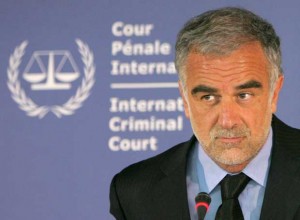Tripoli: April 12
International Criminal Court judges have been asked to refer Libya to the United Nations Security Council, because of its . . .[restrict]refusal to surrender Saif Al-Islam for prosecution in the Hague.
ICC prosecutor Luis Moreno-Ocampo made the move after the Libyan government on Tuesday unveiled the court room where it says that it intends itself to try Saif Al-Islam, in a case that it predicted would be concluded before the June parliamentary elections.

On the same day, three ICC judstices, presided over by Judge Silvia Fernandez de Gurmendi, rejected a second petition from the Libya government requesting a delay in the court order that Saif be handed over. Libya has protested it needs more time to argue that, under Article 95 of the Rome Statue that founded the ICC, it can demonstrate that the case is being dealt with properly in the Libyan courts.
The ICC judges have rejected two separate Libyan petitions for delay. Moreno-Ocampo successfully pleaded that the Libyan authorities had given no convincing outline of their argument. His objections were also sustained on the technicality that court filings should not exceed 20 pages of 300 words each. Libya’s filing ran to 8,000 rather than the required 6,000 words.
Reuters today reported Moreno-Ocampo telling a panel of judges: “The fact that the Libyan authorities have filed a request for leave to appeal does not exempt them from compliance with the chamber’s decision.”
If the ICC judges agree to report Libya to the Security Council, for failure to comply immediately with its order to hand over Saif Al-Islam, the UN has a number of options. It could pass a fresh resolution demanding Tripoli comply with the ICC or it could decide to impose sanctions.
On compromise being floated last night was that the ICC could hold its proceedings here in Tripoli. This is permitted under Article 62 of the Rome Statute. However on the two occasions where the ICC was moving to do this, in Kenya and the Democratic Republic of the Congo, the plans were called off because of security and infrastructure concerns. In addition, given the ICC’s exhaustive attention to legal detail and therefore slow pace, it is unthinkable that any local trial of Saif Al-Islam would even begin, let alone end before June’s elections.
Tweet
[/restrict]






